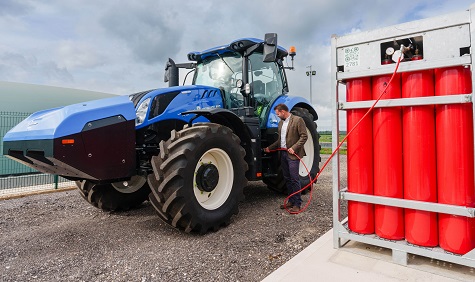
A visit to the John Lewis Partnership’s Leckford Estate by DEFRA minister Lord Benyon has helped highlight how clean energy technology developed in Britain is capturing methane produced by the partnership’s own cattle - and turning it into fuel for the farm’s tractors.
British-based Bennamann and New Holland - whose parent CNH has invested significantly in Bennamann, becoming majority shareholder - are working together on the Hampshire farm to capture the methane gas given off by decomposing manure produced by cattle when they are housed in winter, and that is stored until it can be spread on the fields in the drier summer months. Capture of the methane - which has over 80 times the global warming impact of carbon dioxide in the first 20 years of its lifetime - is done by using a special cover technology to seal the surface of the normally-exposed pit used to store the liquid manure.
From here, the gas is piped off, filtered and processed to form compressed or liquid fugitive methane (CFM and LFM). It is compressed to 250 bar and then stored, from where it is used to power the farm’s New Holland Methane Power tractors - a 180hp T6 model is already available from the manufacturer, with a 270hp tractor in development. Both are modified versions of the diesel-powered models made alongside them at their factory in Basildon, Essex.

The tractor engine’s carbon dioxide emissions are absorbed by the grass eaten by the cattle, so completing a carbon-neutral cycle, while the remaining manure is applied back to the fields. The result, say New Holland, is the ability for farms to become energy-independent, reduce their carbon emissions, and the need for chemical fertilisers.
The John Lewis Partnership announced its intention in 2019 to reduce its operational greenhouse gas emissions to net zero by 2050 at the latest, and the business has a strong commitment to reducing the impact of its farming operations as part of this. The beef unit manure storage gas recovery system is the first of its kind, with Bennamann’s new lagoon sealing technology and gas processing expertise matching with New Holland’s development of engines able to use methane in place of diesel as a fuel, both resulting from significant investment by parent business CNH.
David Rapkins, business director of New Holland UK, Ireland, Nordics and Baltics said, "Not only are we looking to help farmers meet the 2027 deadline to cover lagoons, we are also finding a financial benefit by turning their waste into a commodity. Under CNH, Bennamann’s gas capture and processing technology and New Holland’s Methane Power tractors have come together to tackle the greenhouse gas problem with a circular solution that not only traps methane, but makes full use of it for the power needed for farm vehicles.
"It’s really encouraging to see a business like the John Lewis Partnership adopt the Energy Independent Farm concept this way, and gratifying that its importance has been recognised with a visit from DEFRA minster Lord Benyon.”